JAKE BUCKINGHAM
MULTIMEDIA DESIGNER/VIDEO PRODUCER
JAKE BUCKINGHAM
DIRECTOR OF CREATIVE DESIGN, MEDIA PRODUCTION & MARKETING
Hearts of Immanuel
Immanuel Communities,
Omaha, Nebraska
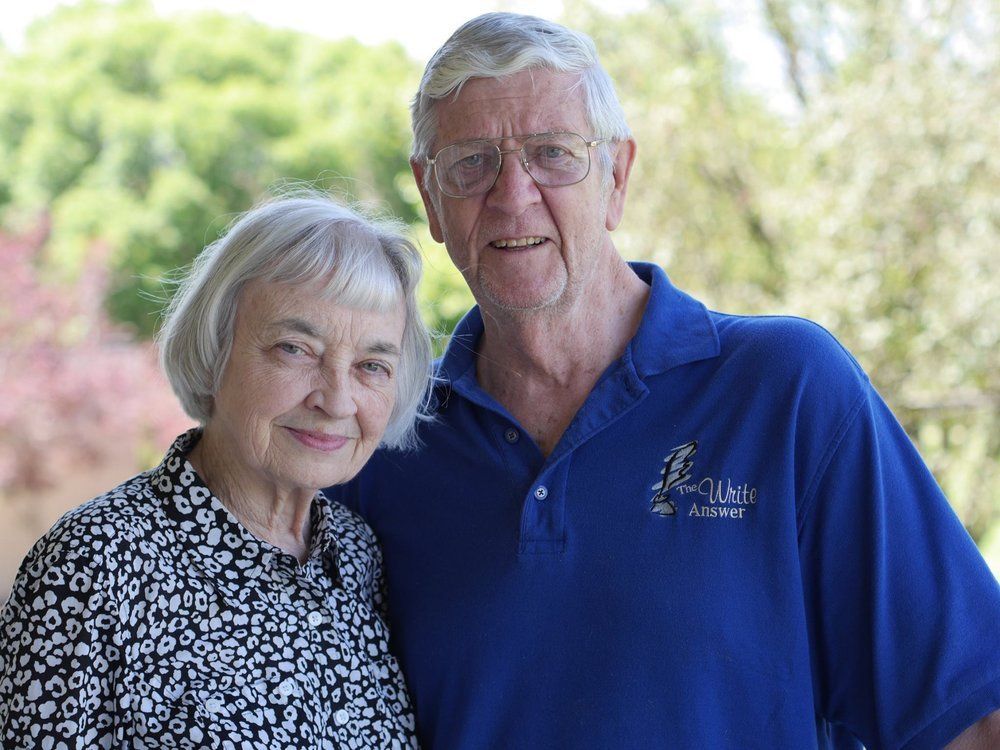
Ed & Pat Guinane
Ed Guinane knew he had something special.
“When I was overseas I felt very alone, so I wrote to her, and she wrote back. I thought that was pretty awesome.”
His wife Pat, of more than 60 years, knew they would eventually get married. He was a grade above her in school.
“We all had friends we ran around with. It was probably inevitable,” said Pat.
Guinane was 21 years old when he was stationed in South Korea.
“They allowed a huge group of us to get away for a bit and attend the USO show with Marilyn Monroe,” said Ed.
Some of America’s biggest stars made several visits to Korea to entertain service members during and soon after the end of Korean War combat.
“It was nice to get away from the daily routine. It was nice to take a break from the monotony.”
After he left the military in 1954, Guinane moved to Sioux City, Iowa. He and Pat tied the knot. Guinane spent more than 30 years working in real estate and Pat worked as a secretary at the local hospital. Together, the couple has four children, several grandchildren, and a great grandchild on the way. Their plate is very full. Back in March, Ed and his wife moved to Omaha where he was born and raised. The two make their home at Immanuel Village.
“The views are beautiful. We love to watch the birds and take in the scenery,” said Pat.
Both count their blessings and are grateful for the exceptional care they have received.
“The experience has been really nice. The people are wonderful and very caring. All of it has been really nice,” said Pat.
With more than 60 years of marriage and counting, one might wonder how you make it that far.
“For many, many years we made a promise to each other that we would never carry a fight overnight. We would never go to bed angry. It isn’t worth it,” said Ed.
“Then you almost have to laugh in the end because what we usually argued over was pretty ridiculous,” said Pat.
“I fess up to the fact that I’d be lost without her,” said Ed.
“And I couldn’t live without him. We couldn’t live without each other,” said Pat.
“She’s put up with me for this long. That’s pretty damn good.”
Hearts of Immanuel
Immanuel Communities,
Omaha, Nebraska
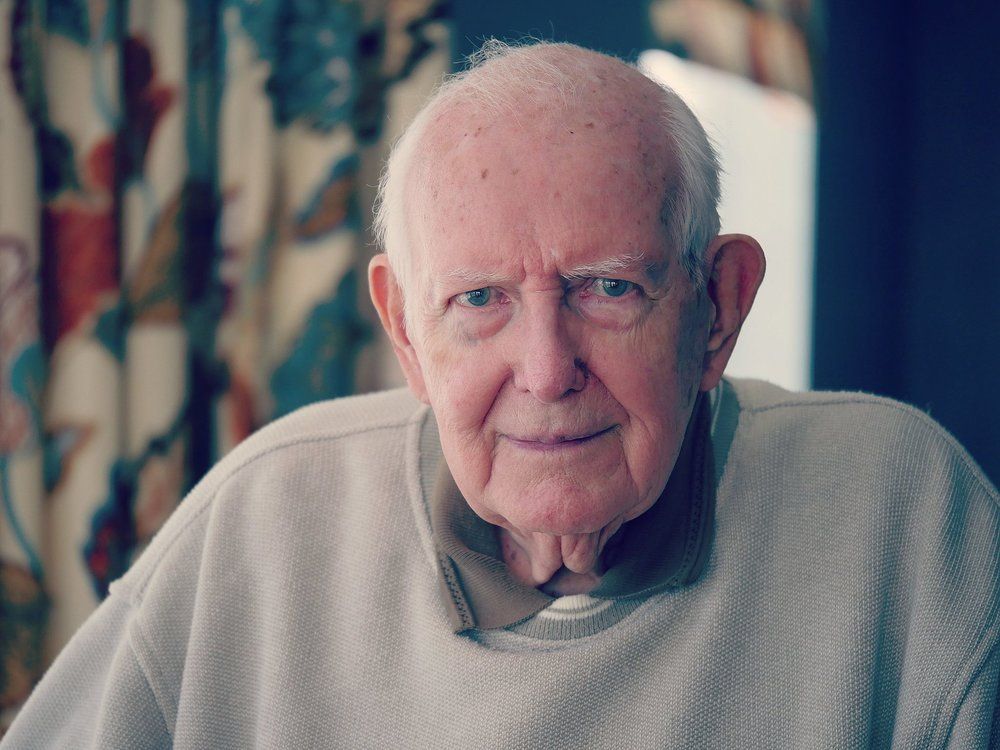
Dr. Byron B. Oberst
Who would have thought a shoulder injury in high school would eventually lead to a life-long career in medicine?
“I was a sophomore at Omaha North High School at the time when I injured my shoulder “trying to play” football. At 140 pounds, I was not very effective out on the field,” said Dr. Byron Oberst.
It didn’t take him long to find his passion. It was right in front of him.
“The doctor treated my shoulder injury and that experience really influenced me to pursue a career in medicine.”
Born and raised in Omaha, he graduated from the University of Nebraska Medical Center in 1943, known then as Omaha Medical College. Dr. Oberst then spent time in the Army at Fort Dix in New Jersey and Sendai, Japan before moving back to Omaha to start his own private practice in 1951.
“Over time I had a huge practice and a large consulting practice as well. At one time I did work for more than 160 doctors outside of the Omaha area.”
He spent nearly 40 years as a pediatrician caring for some of Omaha’s youngest patients.
“In the early days, it was mostly infants; and I soon became a high-risk premature doctor.”
Back then, doctors were battling the Rh disease also known as Rhesus. It's a type of hemolytic disease of the newborn which typically occurred in pregnancies where the mother’s blood is Rh negative and the fetus’s father is Rh positive, leading to an Rh+ pregnancy. During the birth, if the mother is frequently exposed to the infant’s blood, this usually caused the development of antibodies which would then be passed down to the fetus through the placenta. In many cases that would cause deafness, mental deformities, and sometimes fetal death from heart failure. To treat that disease, doctors like Dr. Oberst had to replace the baby’s blood through an exchange transfusion where the blood is exchanged with other blood from donors.
“I did 500 of those exchanges.”
He saw the very first shot of penicillin given at the Nebraska Medical College and Hospital. Pediatric immunizations became very important in those days as children were being immunized against such diseases as diphtheria and polio. In 1952, Nebraska had the worst polio outbreak in the state’s history.
“People were so frightened. More than 360 children with polio were treated at Children’s Memorial Hospital during that summer. Most of us pediatricians lived in the hospital during that time as well.”
His private practice centered on the well child.
“My efforts focused on health care and health care delivery to young people. We all volunteered to do tuberculosis testing for children at area schools. We even had a well-baby station at 24th and Lake Street in Omaha between 1952 and 1958 where we weighed, measured newborns and infants.”
He and other doctors would talk to new mothers about best practices and proper care for their babies. He chose a career in pediatrics because of the challenge.
“The patient cannot talk back to you, so you have to become a great observer. If you stay around young people, you will always stay young.”
And that could not be more truthful for him. Now at 93 years old, Dr. Oberst continues to be a life-long learner.
“I’ve written seven books and one children’s story. I also take guitar lessons.”
What songs can he play?
“Almost nothing! I’m still trying to learn certain songs.”
His grandson, singer-songwriter Connor Oberst, who is best known for his work with the American indie rock band Bright Eyes, recently married a woman of Hispanic descent who is working on her United States citizenship. Dr. Oberst wants to be able to communicate with her, so he is using two computer programs to learn Spanish.
“Don’t ask me anything in Spanish right now though, I’m still working on that too."
Dr. Oberst was married to his wife Mary for 66 years until her death in 2011. Together the couple raised three boys: Byron, Terrance and Matthew.
“Mary came from a family of four girls. She had to learn about baseball. Three strikes and you are out. She hated football and wrestling but the boys loved it. We had a wonderful life together. She had a lot of compassion and patience. She was a great mother and wife."
After retiring in 1988, Dr. Oberst and his wife traveled the world together, touching 48 of the 50 states and made trips across the pond to England, Rome, the Greek Islands, and other European territories. He has lived at Lakeside Village for about five and a half years, and he wouldn’t have it any other way.
“You have to have exercise, access to faith, family, safety, health, and activities to keep you busy. I get all of that and more here at Lakeside Village.”
And for Dr. Oberst, it truly was love at first sight.
“I walked in the door and just fell in love with the place. I saw the grounds and the community. Most retirement communities I visited have no place for people to really walk, talk and visit with one another. I wanted a place where I could go out and walk, see the flowers, and get fresh air. I can do all of that here at Lakeside Village. It’s one of the reasons why I love living in an Immanuel community. It really is a lovely place.”
Hearts of Immanuel
Immanuel Communities,
Omaha, Nebraska
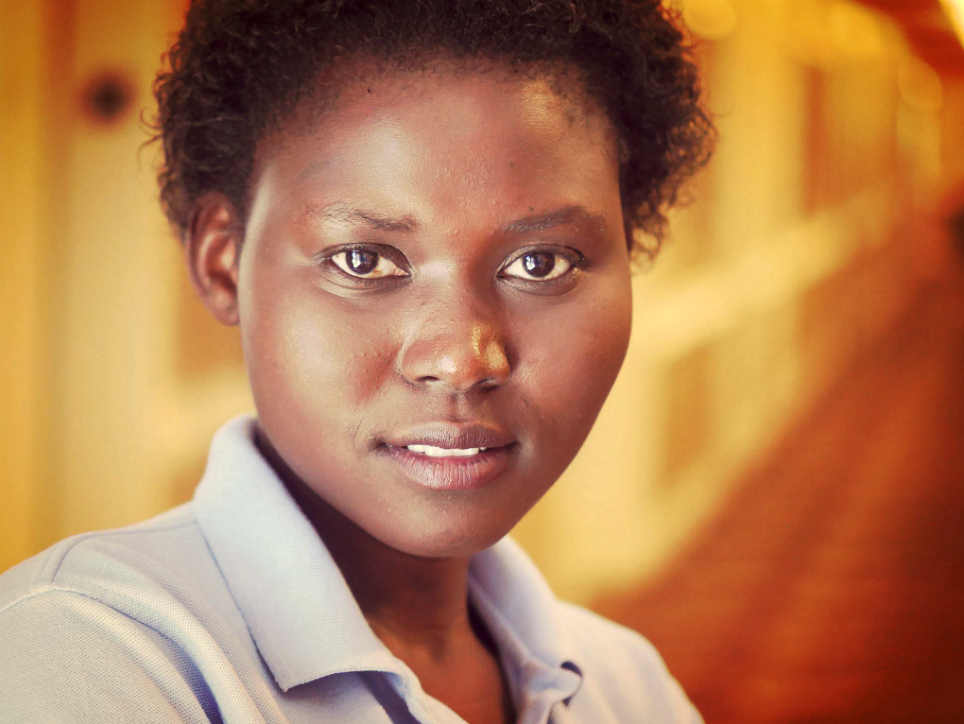
Paula Bongomin
Twenty-six-year-old Paula Bongomin knows the harsh reality of lacking the simple things in life that many people take for granted.
“We didn’t have clean water from which to drink or bathe.”
A native of South Sudan, a country in northeastern Africa, Bongomin and her five siblings are refugees who have lived in the United States for five years. The family immigrated to America shortly after their mother moved here to provide a better life for them.
“My mother told us that if she was going to give us a better future, she had to sacrifice and leave us to work in the United States.”
The Bongomin siblings moved to Uganda where they spent time in camps after fleeing the civil war in South Sudan.
“It was very difficult in Uganda. We had very long days. We went to school from seven in the morning and didn’t get home until seven in the evening.”
She knew it was going to be a long journey each day as well.
“We had to walk long distances and many miles because there was no transportation and by the time we arrived to school, I was so tired and exhausted. I didn’t feel like doing anything.”
Bongomin lost her father to the civil war when she was only three days old.
“My Mom later told us that he would never be coming home. Even though he died when I was very young, I still think about him a lot. I wonder what kind of father he would have been and where our family would be had he not lost his life in the war.”
When you hear the word heart, there is only one person that comes to Paula’s mind. And that’s her mother.
“She has a lot of heart. She’s my inspiration and she inspires me every day. She’s a very strong woman who raised all of her children by herself.”
Her mother worked for five years packaging food and products before disability took its toll.
“She can’t walk very well but I am so thankful for what she has done for me and our family. She’s the reason we are here today.”
Her mother wanted all her children to get an education because she believes it will help them later in life.
“She wants all of us to be able to read and write in the English language, to read our own letters and write our own names. She has given so much to me and I want to give back to her.”
And that is one of the reasons why Bongomin works here at Immanuel.
“The one thing my mom wants us to do is give back to this country by helping others. And that is why I chose to care for seniors. That is truly my blessing, my way of giving back to my community which has done so much for me.”
And she knows that being a caregiver is more than just a job.
“You may not realize it now but the impact we make in caring for our seniors will last forever.”
She’s been with Immanuel for two years, working as a med aide at Pacific Springs Village. But she doesn’t just give medication to seniors; she develops a relationship with them.
“The residents inspire me a lot. I listen to them. They have so much to tell. They have been through so many different experiences. I have learned so much from them.”
Bongomin recently passed her test to become a United States citizen and received her citizenship certificate. She says many of the residents often ask her what she plans to do in the future now that she is an official citizen of the United States.
“It comes with a lot of responsibility. Now I have a country I can claim as my own. I must fulfill my duties by working hard and helping others. Citizenship comes with a huge responsibility.”
She credits Immanuel for helping her realize that importance.
“I am learning so much as an employee of Immanuel. We not only serve our residents, but we are God-fearing people. We are reverent towards the Lord in many ways as we strive to treat everyone equally and with respect.”
And our mission and values are not just statements to her.
“We live out our mission by being there for our residents whenever they need us. We serve their needs but we also go above and beyond that by establishing relationships with them built on trust, respect and responsibility.”
It has been a long journey for Bongomin and her family. She knows the road ahead may be even more challenging but she's ready.
“I want to challenge myself. I want to get better at what I do.”
Bongomin is currently going to college and eventually wants to go to law school.
“My goal is to help people have a voice. This is also an opportunity for me to help other refugees who may be on similar journeys as well.”
And she is grateful to be here in America because she knows her dreams can finally become reality.
“You can do anything you want and become anything you want if you put your heart into it. That is the beauty of this country. You have the freedom to dream and the freedom to reach your highest potential.”
Hearts of Immanuel
Immanuel Communities,
Omaha, Nebraska
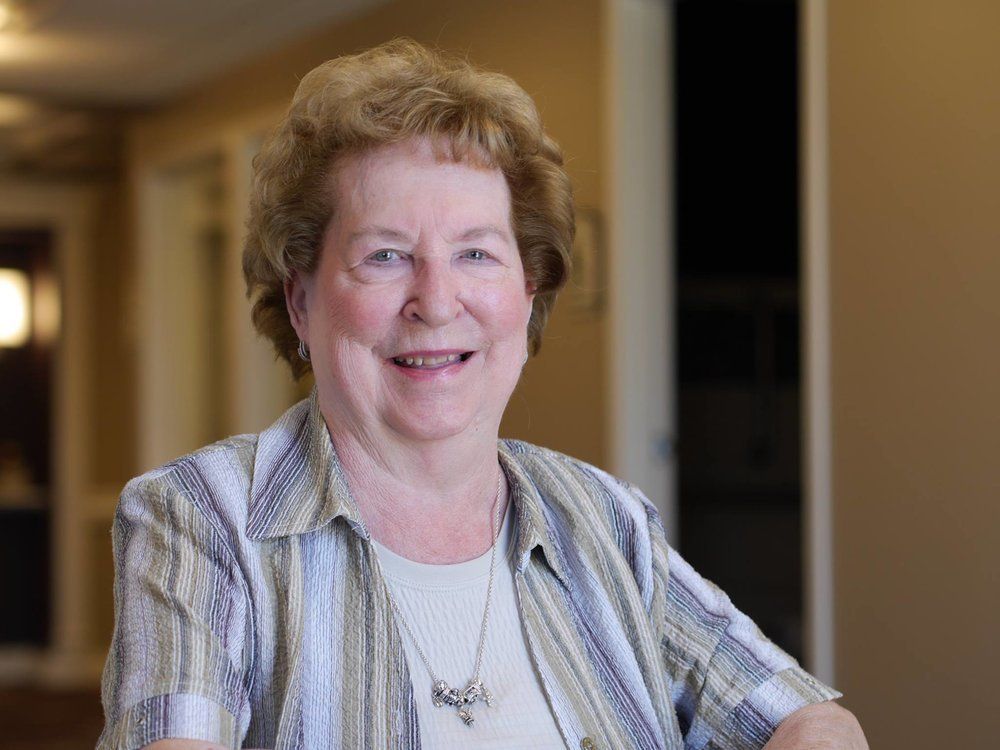
Dorothy Tokarski
Dorothy Tokarski never stopped dancing.
“I danced since I was a toddler and I just kept going. Then I got to be a professional.”
At 91 years old, she may not have the same moves that graced the dance floor many decades ago, but she can still recall those memories and moments that have shaped her life.
“We had a USO on 16th and Harney Street in Omaha. It was a place where men would come in and have lunch and enjoy a variety show.”
And she was one of those performers.
“I came in and performed with other girls. But I was also a solo dancer and performed acrobatics. I would do a tap dance routine too.”
When she was 13 years old, Tokarski started performing at USO shows and events in different cities around the country.
“It was just very fun and entertaining to get into a big place with a lot of people and perform and put on a show for them. I loved it.”
But she also wanted a family.
“I performed even after I got married but stopped when I had my first child.”
She missed dancing so much that Tokarski did the next best thing.
“I thought well, I’d love to teach it.”
And with that desire, Tokarski opened up Dorothy Tokarski Dance Studio in Omaha in 1954.
“I put an ad in the paper and soon a lot of people started signing up.”
She helped inspire and launch the careers of several professional dancers including Olympic gold medalist and retired American gymnast Jim Hartung.
“I taught him for 10 years.”
Not only was she able to continue feeding her soul as a dancer but teaching gave her an even greater purpose as a mentor.
“I helped my students express themselves. They could get up in front of a crowd of people and speak and perform. It gave them poise.”
Many of her students went on to become school teachers and professional athletes.
“I loved the work. I always enjoyed seeing them progress and go on in life to do some really great things.”
She retired from teaching after 34 years and was married to her husband Eugene for 60 years before he passed away in 2008.
“We went to the same high school but never dated during that time.”
They eventually struck up a conversation when he entered the military.
“When he was in the service, he called me. We went out on a date and that led to marriage,” said Tokarski.
Eugene worked as an optician in Omaha for 45 years and was one of her biggest supporters.
“I put on a dance recital every year and he would always say let’s go. Let’s get the show on the road. Needless to say, we were never late.”
She misses his humor the most.
“At several of the recitals he would ask me if I was ready. I would say no. He would pull the curtain anyway.”
Together, the couple has two daughters, five grandchildren and one great grandson. And for the last seven years, Tokarski has made her home at Pacific Springs Village.
“I’ve enjoyed it very much. I like the people and staff. They’re very good to me. It’s like one big happy family.”
Hearts of Immanuel
Immanuel Communities,
Omaha, Nebraska
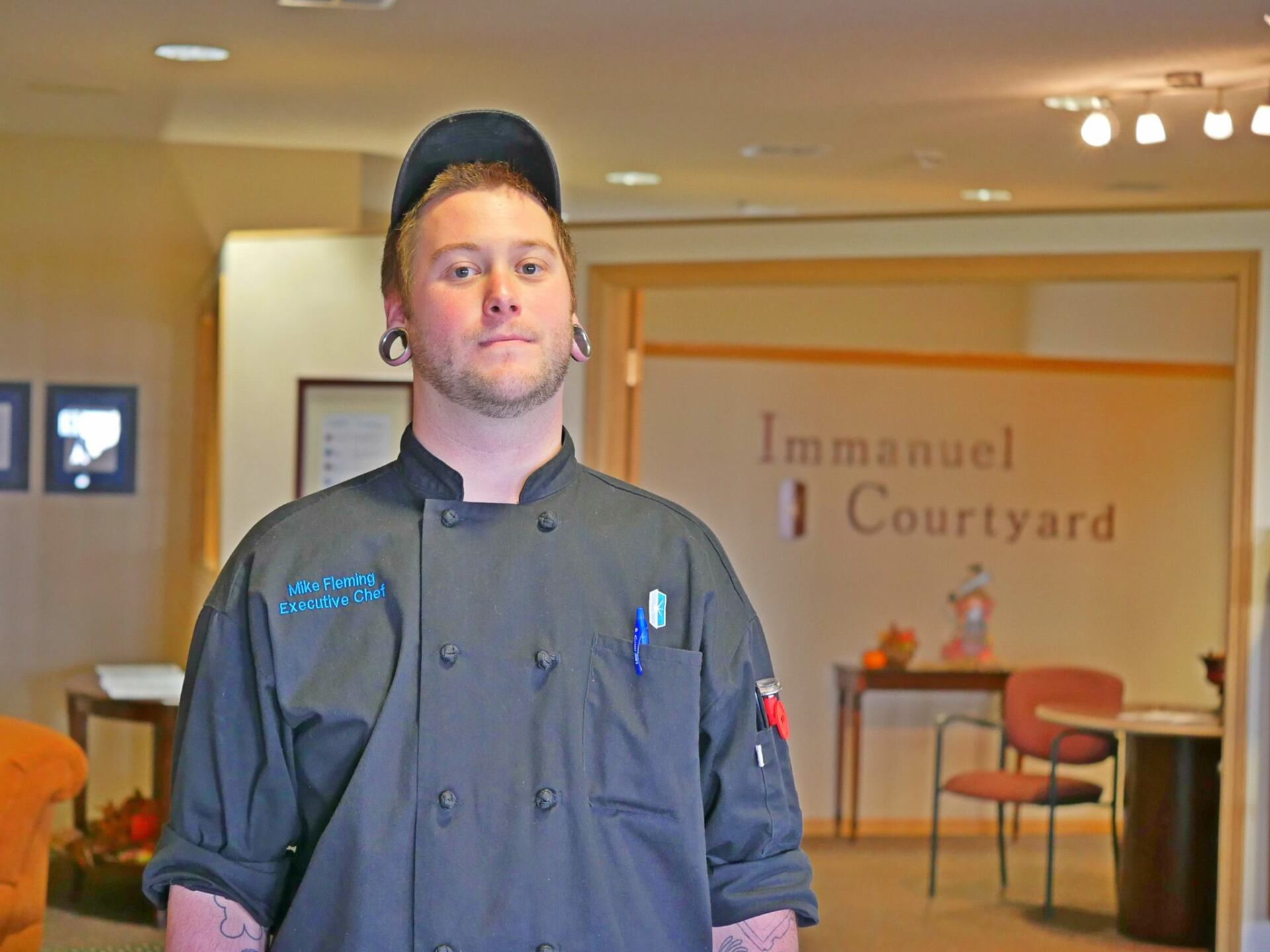
Michael Flemming
Years ago, if you told Michael Fleming he would be cooking for a living, he would probably say you were crazy.
“I originally went to school for computer networking.”
But he didn’t want to sit behind a computer in an office all day.
“I didn’t want to do that for the rest of my life.”
He also knew he wanted to use his hands in whatever career he pursued.
“Cooking allows me to be hands on with my work. It also allows me to be creative,” said Fleming, who is the executive chef at Immanuel Courtyard, a position he has held for three years.
“I have to come in and do something different every day.”
His job allows him to experiment with different ingredients. Fleming says he rarely uses recipes.
“Most everything I do is from memory. I taste the food I make and I add things often.”
He learned most of his skills from Don Lewis, a former chef at Lakeside Village and Matt Bera, the current executive chef at Lakeside Village.
“They taught me all the basics like how to make sauces, soups and other things. They also broke everything down for me so that I could really understand the prep work and how to make a good meal.”
And he fits into the kitchen culture because of the camaraderie of his team.
“We call it the happy fun zone, because everyone has a lot of fun. We really love what we do.”
And that's why Fleming's kitchen staff is a huge part of his success.
“I’ve learned so much from them. They’ve taught me new things about being a pastry chef. And whenever I need help, I can always count on my staff to have my back. They support me whenever I need it.”
The residents appreciate him too.
“My work is super fulfilling. To give something good to residents three times a day is one of the best feelings in the world.”
But he is more than just a chef.
“We’re more like family. I listen to the residents and I always tell them to come to me for ideas and suggestions on different food dishes.”
Fleming’s passion for helping others and cooking was the perfect marriage. He also had a desire and ambition to explore different foods.
“I don’t like eating the same thing. I don’t like cooking the same thing. There may be thousands of recipes out there for the same dish. I’m going to try to cook all of them.”
His passion isn’t the only thing he found here at Immanuel, he also found love. He and his wife, Kylee, a former assistant dining room manager at Lakeside Village, tied the knot in July. They have a one-year-old son named Stephen.
“And we have another bun in the oven,” Fleming laughs, as the two are expecting their second child soon. When he’s not at work, he is doing a lot of house projects.
“I just started gutting the bathroom."
When he needs a break, he picks up his guitar and starts playing some of his favorite blues and jazz songs. His one-year-old son is his inspiration.
“Stephen will sit right next to me with his plastic guitar and play along as well.”
The dynamic at Immanuel Courtyard is uplifting. Fleming will be the first one to tell you that.
“Everyone is here to support each other. The residents take care of each other. We all take care of each other. It’s just nice to see an entire community that solely wants to take care of each other. It truly is a great place to work and live.”
All Rights Reserved | Jabuckingham.com